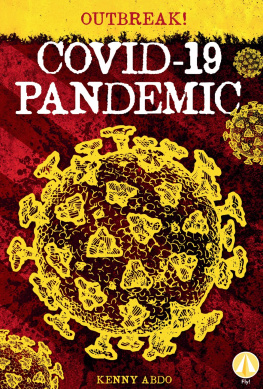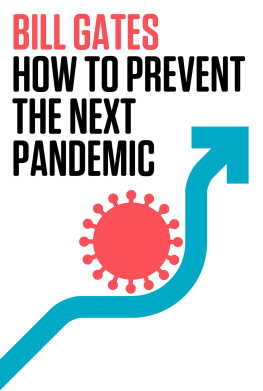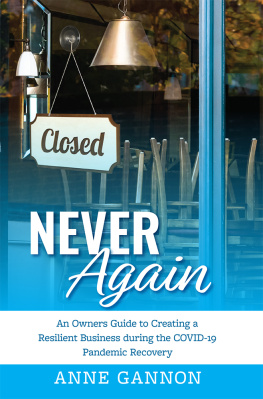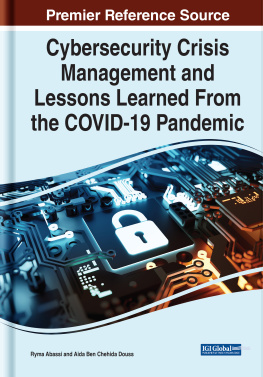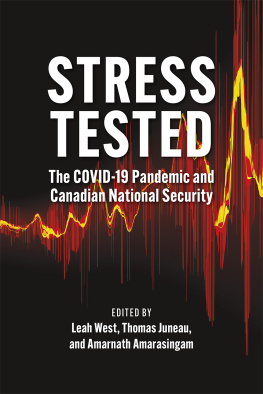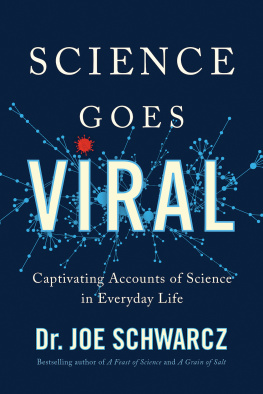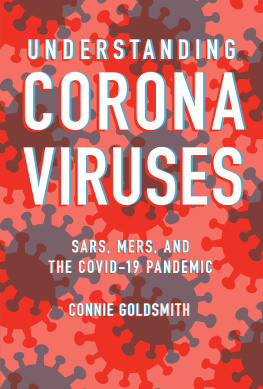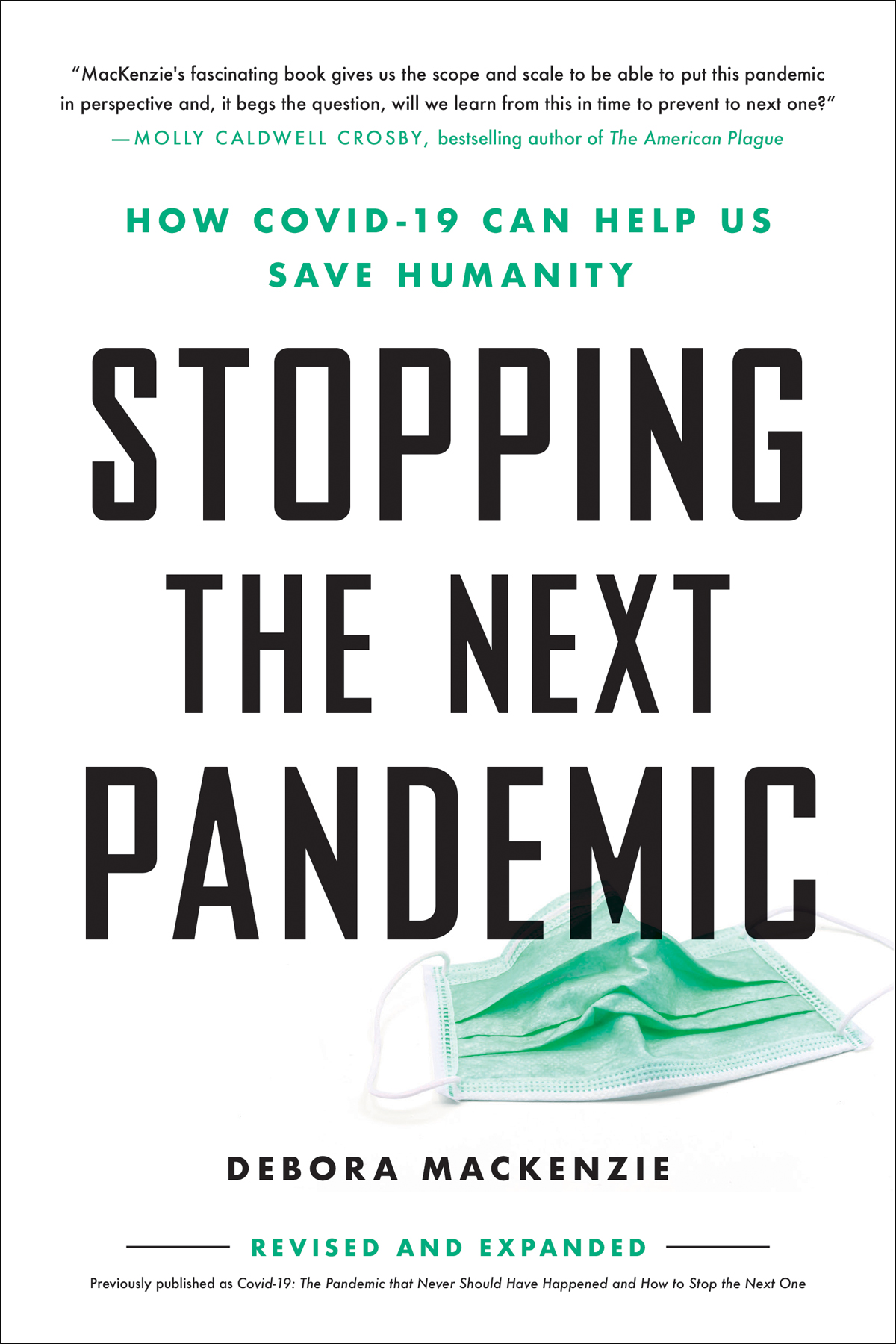
Copyright 2020 by Debora MacKenzie
Cover design by Amanda Kain
Cover photograph copyright Phidsanu Suriyawong/Getty Images
Cover copyright 2020 by Hachette Book Group, Inc.
Hachette Book Group supports the right to free expression and the value of copyright. The purpose of copyright is to encourage writers and artists to produce the creative works that enrich our culture.
The scanning, uploading, and distribution of this book without permission is a theft of the authors intellectual property. If you would like permission to use material from the book (other than for review purposes), please contact permissions @hbgusa.com. Thank you for your support of the authors rights.
Hachette Books
Hachette Book Group
1290 Avenue of the Americas
New York, NY 10104
HachetteBooks.com
Twitter.com/HachetteBooks
Instagram.com/HachetteBooks
First trade paperback edition: September 2021
Previously published as Covid-19: The Pandemic That Never Should Have Happened and How to Stop the Next One
Published by Hachette Books, an imprint of Perseus Books, LLC, a subsidiary of Hachette Book Group, Inc. The Hachette Books name and logo is a trademark of the Hachette Book Group.
The Hachette Speakers Bureau provides a wide range of authors for speaking events.
To find out more, go to www.hachettespeakersbureau.com or call (866) 376-6591.
The publisher is not responsible for websites (or their content) that are not owned by the publisher.
Library of Congress Control Number: 2020938926
ISBNs: 978-0-306-92424-8 (hardcover), 978-0-306-92423-1 (ebook), 978-0-306-92422-4 (trade paperback)
E3-20210730-JV-NF-ORI
For James, Jessica, and Rebecca, who make everything possible. And in grateful recognition of the scientists and journalists who do their best to find out whats going on and try to save us from it.
We must never forget that a dangerous microbe anywhere in the world today could be everywhere in the world tomorrow.
Michael Osterholm and Mark Olshaker, Deadliest Enemy: Our War Against Killer Germs
In six weeks in March and April 2020, I wrote a book called Covid-19: The Pandemic That Never Should Have Happened and How to Stop the Next One. Thats not a long time to write a book, especially during a fast-moving crisis.
But I could do it because a lot of my work as a journalist, over several decades, was about exactly what was, at that moment, finally happening: a pandemic of a new, emerging virus. And as I watched all those warnings come true, I realized that while people were glued to the day-to-day developments, most people were not reading about that larger story: how we were warned over and over again that this was likely, yet somehow most countries werent readyand what that means for the future.
That tale is still worth telling. To those who said, well, this book will be out of date pretty fast, let me say: this is the revised and updated version, and we have learned a lot, so I have added a lot, but hardly anything from before needed changing.
Thats because what I wrote was mainly about things that would not change before you read this: what had happened already that led to Covid, and more important, that will lead to more outbreaks like itthe big picture of pandemic risk. Even in the early days, it was clear that Covid-19 both vindicated the warnings and showed what we must do to stop thisand worsefrom happening again. That hasnt changed. If anything, it is even clearer now.
And people still need to hear it. Larry Brilliant, a leader of the campaign that eradicated smallpox in 1980, has a favorite saying. New viruses are increasingly jumping to people from animals, he says. Outbreaks are inevitable. But pandemics are optional.
That may seem an outrageous claim to make after all the tragic death and economic wreckage weve witnessed. But it is true. We can do our best to prevent outbreaks, catch those that happen anyway early, respond fast, and stop them from spreading out of control. We can stop the next pandemic.
Hence the title of this updated book. The whole point of understanding what happened to unleash Covid-19 is to stop something like this from happening again. And scientists agree, just as they did before Covid, that the question is not if that is going to happen, but when, and when could be any time. And as you will read in these pages, there are way worse viruses out there. Our civilization, like all the others before us, can collapseand a bad enough pandemic could help do it.
So, please: learn about what happened with Covid. Use that information to stop the next one. Save humanity. That about sums it up.
There are some things I can say now that I could not say in 2020. One is about communication. People are not good at hearing warnings about the ill-defined future, but we are very good at listening when some threat is imminent or now underway. I decided to write this book mainly because I hoped that, now that a pandemic was actually happening, people would finally be open to all those pandemic warnings I had been hearing about from scientists for years. I still think that is true.
But fear and anxiety can make us a bit too open to some kinds of information. The World Health Organization (WHO) has talked from the beginning of this pandemic about an infodemic of misinformation that has accompanied it, and even a new science of infodemiology to track and predict misinformation the way epidemiologists track and predict viruses. Whether this will allow us to actually control epidemics of misinformation, conspiracy theories, and rampant denialism is an open question but an important one to answer if we are to stop the next pandemic.
Lets look at one example: masks. Surgical masks, as we all know now, were designed to stop germs getting out, so doctors wouldnt infect patients. Early in the pandemic, that seemed of little use: people with Covid were expected to be sick in bed, not walking around, exhaling virus. Meanwhile, years of observation had shown these masks dont totally protect you from taking in airborne germs. Plus masks were in short supply early on and needed for health care workers. So the advice was, dont wear them.
But it was true, and it meant wearing masks made sense, even homemade cloth masks that were less effective than surgical masks.
So, unsurprisingly, our knowledge about a totally new virus changed. Hence, the advice changed: wear masks. Observation soon showed that masks stopped people from spreading virus and even, to some extent, from catching it.
What is hard to understand about that? Yet many people brandished the fact that the advice about masks changed as proof doctors and scientists cannot be trusted, or claimed it was all a way to take away our freedom. Some still do. Perhaps its just an eagerness to disbelieve bad news. But there are also plenty of people ready to foment and exploit mistrust, for whatever poweror just Facebook likesit seems to offer. Infection rates soared in places where masks were rejected, and people died as a result.
Should experts have just explained it better? Or do we need to address the fear or discontent that drives people to believe, or become, conspiracy theorists? These are things we need to understand to ward off the next pandemic as surely as we need to watch the viruses youll meet in helps explain the polarization that has afflicted some societies during the pandemic, in turn helping to drive the infodemic.
Another thing I can say now is how Covid fits into the even bigger picture of the risks we face as a civilization. Bear with me: this gets scary, but surprising reasons for hope and optimism are coming.


